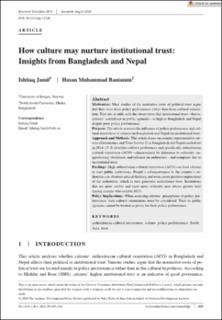| dc.contributor.author | Jamil, Ishtiaq | |
| dc.contributor.author | Baniamin, Hasan Muhammad | |
| dc.date.accessioned | 2021-06-02T12:22:53Z | |
| dc.date.available | 2021-06-02T12:22:53Z | |
| dc.date.created | 2021-01-05T16:10:14Z | |
| dc.date.issued | 2020-09-06 | |
| dc.Published | Development Policy Review. 2020, 1-21. | |
| dc.identifier.issn | 0950-6764 | |
| dc.identifier.uri | https://hdl.handle.net/11250/2757416 | |
| dc.description.abstract | Motivation
Most studies of the normative roots of political trust argue that they stem from policy performance rather than from cultural orientation. That sits at odds with the observation that institutional trust—that is, citizens’ confidence in public agencies—is high in Bangladesh and Nepal despite poor policy performance.
Purpose
The article assesses the influence of policy performance and cultural orientation of citizens in Bangladesh and Nepal on institutional trust.
Approach and Methods
The article draws on country representative surveys (Governance and Trust Survey 2) in Bangladesh and Nepal carried out in 2014–15. It identifies cultural preferences and specifically authoritarian cultural orientation (ACO)—characterized by deference to authority, unquestioning obedience, and reliance on authorities—and compares this to institutional trust.
Findings
High authoritarian cultural orientation (ACO) can lead citizens to trust public institutions. People’s submissiveness to the country’s authorities can obstruct critical thinking and even create positive impressions of the authorities, which in turn generates institutional trust. Institutions that are more visible and exert more authority may attract greater trust among citizens who exhibit ACO.
Policy Implications
When assessing citizens’ perceptions of policy performance, their cultural orientations must be considered. Trust in public agencies cannot be treated as proxy for their policy performance. | en_US |
| dc.language.iso | eng | en_US |
| dc.publisher | Wiley | en_US |
| dc.rights | Attribution-NonCommercial-NoDerivatives 4.0 Internasjonal | * |
| dc.rights.uri | http://creativecommons.org/licenses/by-nc-nd/4.0/deed.no | * |
| dc.title | How culture may nurture institutional trust: Some empirical insights from Bangladesh and Nepal | en_US |
| dc.type | Journal article | en_US |
| dc.type | Peer reviewed | en_US |
| dc.description.version | publishedVersion | en_US |
| dc.rights.holder | Copyright 2020 The Authors | en_US |
| cristin.ispublished | true | |
| cristin.fulltext | postprint | |
| cristin.qualitycode | 1 | |
| dc.identifier.doi | 10.1111/dpr.12520 | |
| dc.identifier.cristin | 1865870 | |
| dc.source.journal | Development Policy Review | en_US |
| dc.source.pagenumber | 419-434 | en_US |
| dc.identifier.citation | Development Policy Review. 2021, 39 (3), 419-434 | en_US |
| dc.source.volume | 39 | en_US |
| dc.source.issue | 3 | en_US |

